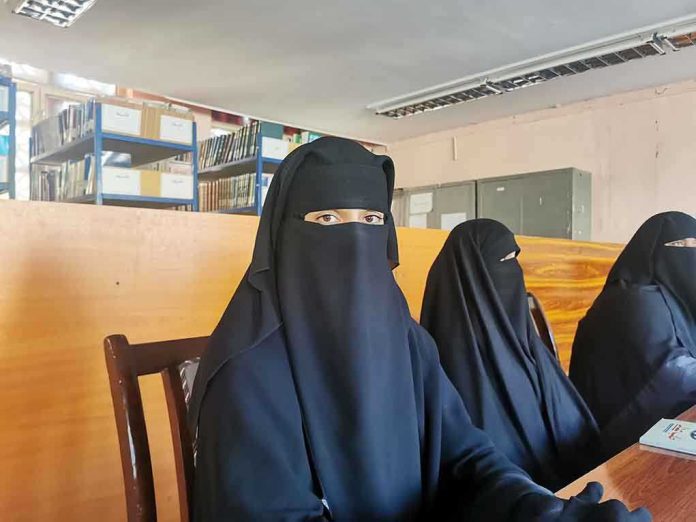
Justice Department closes investigation into Dallas Muslim community amid alarming 100% increase in attacks on religious venues nationwide.
Key Takeaways
- The Justice Department has closed its federal civil rights investigation into the Muslim-centered EPIC City development near Dallas without filing charges.
- FBI data reveals religious facility attacks have doubled since 2021, with the Justice Department prioritizing the prosecution of these crimes.
- Religious institutions are implementing heightened security measures, including armed guards and alarm systems, in response to increasing threats.
- Attacks are often driven by white nationalism and target minority and LGBTQ-friendly religious communities.
- The Tree of Life synagogue in Pittsburgh continues to deal with lasting trauma from the 2018 shooting that killed 11 people.
Justice Department Drops Investigation of Muslim Community Development
The U.S. Department of Justice has closed its federal civil rights investigation into a planned Muslim-centered community near Dallas without filing charges. The investigation began after U.S. Senator John Cornyn raised concerns about potential discrimination against Christians and Jews at the EPIC City development. The developers, Community Capital Partners (CCP), have consistently maintained they were unfairly targeted due to their connection with the East Plano Islamic Center, arguing the investigation would never have occurred if the community were centered around a Christian or Jewish place of worship.
“CCP has affirmed that all will be welcome in any future development,” stated a Justice Department letter from the case conclusion.
The developers have pledged to revise their marketing materials to emphasize inclusivity while maintaining their commitment to adhering to the Fair Housing Act and other legal guidelines. The project has faced multiple investigations from Texas state officials, including claims that the development would impose Islamic law. These accusations have been strongly refuted by the development team and criticized by civil rights organizations as discriminatory. The planned development includes over 1,000 homes, a faith-based school, a community college, assisted living facilities, and athletic fields.
— Jared (@zerofiveniner) July 27, 2024
Alarming Rise in Attacks on Religious Venues
While the Justice Department has closed one investigation, it faces a much larger crisis in the form of escalating violence against religious facilities across America. FBI data shows a disturbing nearly 100% increase in assaults on religious institutions from 2021 to 2023. This surge has prompted the Justice Department to pledge stronger action against perpetrators of such crimes, with Assistant Attorney General for Civil Rights Harmeet Dhillon taking a hardline stance against these attacks that she describes as a form of domestic terrorism.
“I think it’s a form of terrorism, because attacks on churches are meant to terrorize people. And they’re meant to deter people from going there. And so it makes everyone feel unsafe,” said Harmeet Dhillon, Assistant Attorney General for Civil Rights, from an interview about the Justice Department’s response.
Recent convictions highlight the severity of these threats. Rui Zhang was sentenced to 25 years for planning an attack on a Virginia church, while Zimnako Saleh was convicted for targeting churches across multiple states. The Southern Poverty Law Center notes that these attacks are partially driven by white nationalism and often target minority and LGBTQ-friendly religious communities. The Justice Department has emphasized the urgency of addressing these crimes, pursuing swift legal actions, and seeking lengthy prison terms for those found guilty.
— Afshin SAJEDI (@AfshinSajedi) August 21, 2024
Lasting Impact on Religious Communities
Few understand the devastating impact of violence against religious venues better than Alan Hausman, president of the Tree of Life synagogue board in Pittsburgh. The 2018 shooting at his synagogue, which killed 11 worshippers, left deep scars on the community that remain raw years later. Hausman describes experiencing ongoing “survivor’s remorse” and explains how each new attack on a religious institution retraumatizes those who have already suffered. Religious institutions in Pittsburgh and nationwide have been forced to implement extensive security measures, including armed guards and sophisticated alarm systems.
“Every time I see another attack, it’s like someone picked the scab off of my wound,” said Alan Hausman, President of the Tree of Life synagogue board, from his account of ongoing trauma following the 2018 shooting.
Synagogues in particular have experienced increased vandalism and harassment, especially following events in Israel. These attacks not only target buildings but also strike at the heart of community life and religious freedom. The Justice Department’s commitment to prosecuting these crimes acknowledges their profound impact beyond property damage. As Assistant Attorney General Dhillon emphasized, the goal is to ensure that “no one feels like churches, houses of worship, people of faith are soft targets in the United States.” This approach recognizes that protecting religious venues means safeguarding the communities that gather within them.
“We want to shut that threat down by making sure that no one feels like churches, houses of worship, or people of faith are soft targets in the United States. That is why it’s a priority,” stated Harmeet Dhillon, Assistant Attorney General for Civil Rights, from her explanation of the Justice Department’s prioritization of these cases.



